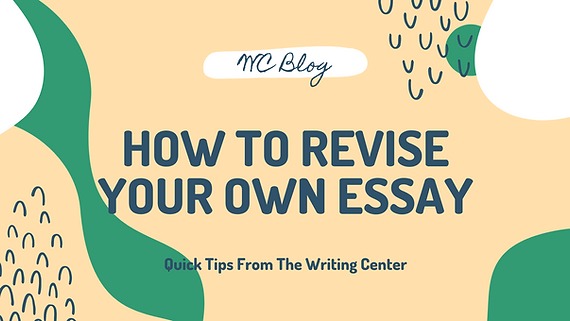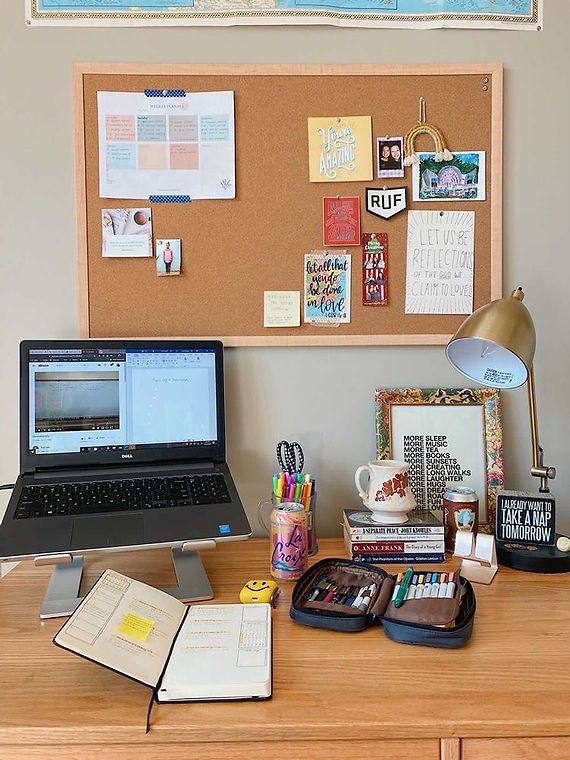How To Revise Your Own Essay
by Annie Marks

Hello everyone! Thank you for joining me (Annie!) as we jump back into our “Quick Tips From The Writing Center” series. Our goal here at the Writing Center is to help you produce writing you are proud of and to encourage your growth as a writer. We truly enjoy working through your writing with you and offering tips and strategies. However, we are aware that we can’t always be available to help you. You may need to revise a paper when the Writing Center is closed or you simply may not have time to stop by the Writing Center during a busy week. While we can’t help you revise your paper in those exact moments, we can give you some helpful revision strategies to use on your own. So, I will explain six specific revision strategies in the list below! (P.S. I left five errors in the list to help you practice these strategies. Can you find them?)
1. Walk Away From Your Essay
You just finished the hardest part of your assignmen: writing a complete draft of your essay! Now, you should reward yourself by taking a break. Not only will a break allow you to celebrate your great accomplishment, but it will also give your brain some time to recover before you begin editing. You will return to your essay with a fresh set of eyes and a clear mind. So, grab a cup of coffee, catch up with your friends, go for a walk, take a nap, and have fun!
2. Set Up Your Workplace
Once you return from your well deserved break, you should take some time to set up your workplace. You should find an area on campus that is quiet and free of distractions, such as the library, Jennings Courtyard, or your dorm room. You may find that it helps for this area to be different from your usual writing spots. You could also play some music to help you concentrate and put your phone on, do not disturb. When I set up my workplace, I find it beneficial to get in the mindset of my professor. So, I print off a hard copy of my paper, sit at a quiet desk in the library, and read through the paper as if I were grading it.

Set up your workplace in a quiet, distraction free area!
2. Change The Way You Read
During the revision process, you will stare at the same piece of writing for a long time! You will probably become accustomed to reading the same words over and over again, so you will naturally speed through the writing without actually reading each word In turn, you may end up missing some errors in your paper. But, you can force your eyes to slow down by reading the essay aloud, using your finger to point at each word, and reading the essay backwards. You can also change the font, font size, or line spacing of your paper. By using these strategies, you will be able to look at each word and see how it fits into your essay.
4. Split The Revision Process Into Phases
The revision process can seem rather daunting because you have so much to revise. You have to check for spelling mistakes, a unique thesis, clarity of ideas, clear transitions, and more! You can help yourself tackle all of these different areas by focusing on one area at a time. I suggest you make a list of every area you need to revise, then order these areas of concern from most important to least important. Once you have this list, you can revise the essay for each individual area before moving onto the next.


Create a list of areas you need to revise and check each area off as you go!
5. Check Again After Each Edit
By the time you reach the end of the revision process, you will probably be tired of reading the same piece of piece. You may even find yourself speeding through the process because you just want to be done. No matter how tempting it may be to finish the process quickly, I urge you to take your time. You should reread and re-check your writing each time you fix a mistake. If you continue to reread your writing until you can’t find a single mistake, you will submit a writing piece you feel confident in!
6. Know When To Put The Pencil Down
In my opinion, the hardest part of revising an essay is knowing when you’ve done enough. I always want to work on the writing until the very last minute and I’m sure many of you can relate. However, at some point, you must accept that you have done all you can do within the time you have left. If you continue to work on the writing past that point, you might make the writing worse or do something drastic like changing the entire thesis.

Know when to put the pencil down, give a thumbs-up, and submit your paper!
Of course, these six tips are just a few of the many strategies you can use to revise your essay. With time and practice, you will find a mix of revision strategies that work best for you. You can always visit the Writing Center to learn more tips and tricks!


